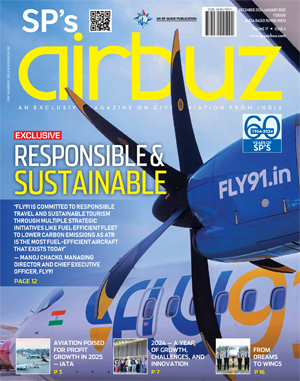Indian MRO on the Move
India’s indigenous MRO sector carries a significant growth potential. India currently has an outstanding order of over 1000 aircraft and that means over 400 high-intensity checks at a minimum annually, a huge boost for the domestic MRO players who can now see themselves as a host to serve regional MRO needs.

With the pandemic well behind us, Indian aviation sector is at a cusp of unprecedented growth. Air travel, both domestic and International is picking up. As per various estimates, present commercial aircraft fleet of 700, is likely to grow by 125 aircraft per year, leading to more than 1,500 aircraft over next decade.
Aircraft require continuous maintenance, every single day. The MRO sector provides the critical engineering support to keep aircraft airworthy. Growing aviation sector would demand 200–300 major Maintenance Checks (A to D checks) annually. Having an indigenous Maintenance Repairs and Overhaul (MRO) infrastructure thus becomes a significant factor in development of this sector.
There are eight major players in the Indian MRO market with the requisite skills to undertake Maintenance Checks. Indian MRO market has grown from $800 million in 2018 to slightly less than $2 billion. Of this, only 16 per cent of the business is handled locally. The Indian MRO sector is further estimated to touch $4 billion by 2024.
Presently for more than 80 per cent of the MRO activities are being outsourced by India to Singapore, UAE, Turkey and Dubai. Singapore is a leading one stop solutions provider for aircraft MRO. It contributes one fourth of Asian MRO output, close to 10 per cent of the world share.
India has a large pool of engineering talent, particularly useful in the labour intensive MRO industry with its high skill requirements. This manpower is also comparatively less expensive than other countries in the region. These are big advantages over other Asian and global competitors that India needs to leverage.
Ministry of Civil Aviation (MoCA) has been sanguine of holistic requirement to grant incentives to make the Indian MRO emerge globally competitive. In its bid to encourage MRO operators within the country, the Civil Aviation Minister Jyotiraditya Scindia in September 2021 announced some liberal policy changes that included leasing of land through open tender, instead of pre determined fees by AAI; allotting land for a period of 30 years instead of three to five years earlier; rate of rental reduced from prevailing 7.5 per cent annually to 15 per cent after every three years; and abolishing of 13 per cent turnover royalty charged by the AAI.
Earlier in 2021, other measures by the Government included, reducing Goods and Services Taxon MROs from 18 to 5 per cent; and 100 per cent FDI through automatic route. In March 2021, AAI also demarcated land at eight airports for inviting bids to set up MRO, these include Begumpet, Bhopal, Chandigarh, Chennai, Juhu, Kolkata, New Delhi and Tirupati.
A professionally run MRO is of critical importance to aerospace and defence industries alike. There is scope for civilian as well as defence aircraft to benefit from this move. The biggest benefit will be its ability to create new jobs and a strong global value chain with the civil-defence business interface, which will get the much needed boost.
In order to compete with foreign MROs, Indian MRO companies are required to draw their expansion plans to cater for rising domestic demands and spur export of MRO services outside India. Each MRO company is scouting for volumes and profitability, in such a scenario, we need to keep our commitment to reliability. To be globally competitive, Indian MRO companies need to have high volume and scale of services, technical expertise, suitable access to the supply chain and digitised infrastructure capability.
Changes in the Indian MRO landscape are already visible, on October 18, 2022 Adani Defence Systems & Technologies Ltd (ADSTL) announced its decision to acquire Air Works, one of the most experienced and reputed company, for a value of 400 crore. More such takeover by bigger house or mergers may be in the offing in the MRO sector soon as companies need to invest more in capital expansion, technical upgrades and skill enhancement. There is an urgent requirement for all Indian stake holders to come together and ensure that global safety standards are maintained and strict maintenance timelines are adhered. Indian companies need to leverage their strength in the field of Information Technology and make the best of its highly skilled human resources.
Aviation industry is all about safety that demands an effective inspection and maintenance programme. It is now expected that the Indian MRO industry will take the initiative to position the sector in India for longterm sustainable success and set to zoom up responsibly.





